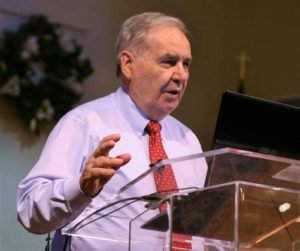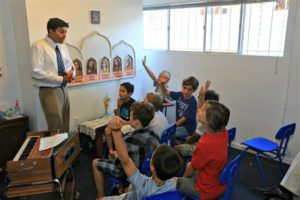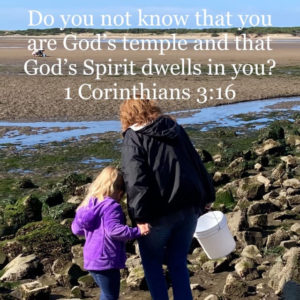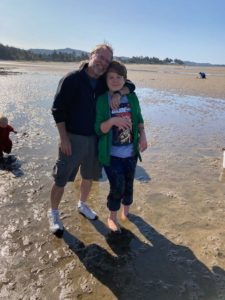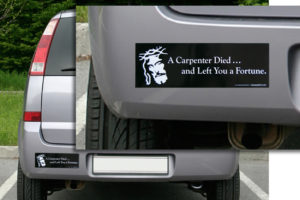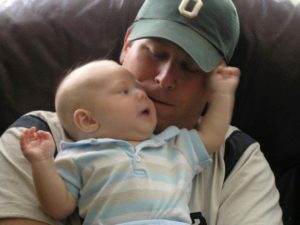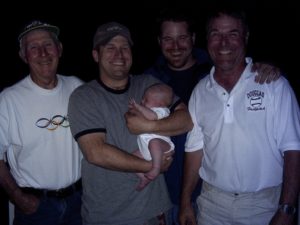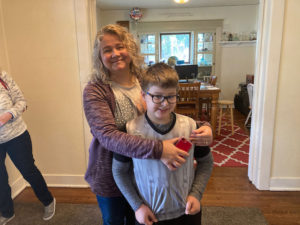Satan must love the teeter-totter theology of the Christian churches today. I remember a day last year at Camas when I had to go to the gym and on the way I passed the 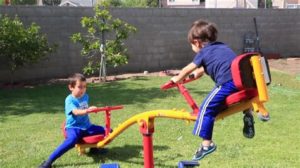 playground. Two of the little kids were sitting on the teeter-totter trying to balance perfectly. One would scoot up a little while the other would scoot back. Try as they might, they just couldn’t get it right. One of the kids was quite a bit larger and the teeter tottered that direction most of the time. Watching them try to get the board balanced just right was somewhat comical. Unfortunately, watching churches trying to get to a balanced theology is not quite as humorous.
playground. Two of the little kids were sitting on the teeter-totter trying to balance perfectly. One would scoot up a little while the other would scoot back. Try as they might, they just couldn’t get it right. One of the kids was quite a bit larger and the teeter tottered that direction most of the time. Watching them try to get the board balanced just right was somewhat comical. Unfortunately, watching churches trying to get to a balanced theology is not quite as humorous.
The balance we should be trying to seek is somewhere between essential and non-essential doctrines. Unfortunately, we have liberal churches that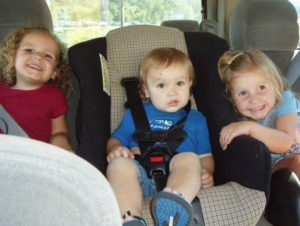 are light on the essentials and conservative churches that are heavy on the non-essentials. Somewhere between those extremes is the balancing point that Satan hates. Unfortunately, because churches tend toward theology on far ends of the spectrum, Christians are hard-pressed to find places to worship that are theologically balanced.
are light on the essentials and conservative churches that are heavy on the non-essentials. Somewhere between those extremes is the balancing point that Satan hates. Unfortunately, because churches tend toward theology on far ends of the spectrum, Christians are hard-pressed to find places to worship that are theologically balanced.
Many churches water down essentials to fill the pews and others wield unessentials like a club to force unnecessary behavior. Satan gleefully roots for both sides to continue their off-balance teetering and tottering. In Proverbs 11:1 we read, “A false balance is an abomination to the LORD, But a just weight is His delight.” In ancient times stones of  perfect weight were used on scales to get precise measurements. When someone would slip a larger stone on the scales it would throw off the legitimacy of the measurement. Churches which add unnecessary weight to the Christian life or ones who take necessary weight away, do an injustice to the gospel. It is exhausting for most people trying to reach a balance. Those two boys on the playground were pretty tired by the time they were finished and they never did get it right.
perfect weight were used on scales to get precise measurements. When someone would slip a larger stone on the scales it would throw off the legitimacy of the measurement. Churches which add unnecessary weight to the Christian life or ones who take necessary weight away, do an injustice to the gospel. It is exhausting for most people trying to reach a balance. Those two boys on the playground were pretty tired by the time they were finished and they never did get it right.
There is an old story that has Satan walking with one of his own demons and they see a man stoop down and pick up a shiny object. The demon asked what it was. Satan told him that it was a piece of truth. “Doesn’t that bother you?” the demon asked.
“No,” answered Satan. I will let him keep it and he will make a religion out of it.”
There are so many religions in the world and all of them pull some truth out of the hat to draw a crowd, but we can set them aside in this discussion. The real concern is with churches which purport to have the truth and it have muddled it up by building their membership on non-essentials or doctrine-light. There are some essentials that every Christian church needs to embrace and other tenants we need to approach with mercy. Churches cannot be built on hairstyles any more than they can be built on a wishy-washy Word that stands for little and accepts everything. In this day and age there is pushback against anyone who sides with truth. Relativism is becoming a religion on its own and as believers, we need to stand against it. There are some parts of doctrine that cannot be compromised. But how do we know what they are?
pull some truth out of the hat to draw a crowd, but we can set them aside in this discussion. The real concern is with churches which purport to have the truth and it have muddled it up by building their membership on non-essentials or doctrine-light. There are some essentials that every Christian church needs to embrace and other tenants we need to approach with mercy. Churches cannot be built on hairstyles any more than they can be built on a wishy-washy Word that stands for little and accepts everything. In this day and age there is pushback against anyone who sides with truth. Relativism is becoming a religion on its own and as believers, we need to stand against it. There are some parts of doctrine that cannot be compromised. But how do we know what they are?
 There is a statement that almost all Christians agree on- “Essentials, unity; non-essentials, liberty; and in all things charity.” Where they do not agree on is what is essential and non-essential. Lists of the essentials vary from two to fourteen, so how are we to know what is truly essential?
There is a statement that almost all Christians agree on- “Essentials, unity; non-essentials, liberty; and in all things charity.” Where they do not agree on is what is essential and non-essential. Lists of the essentials vary from two to fourteen, so how are we to know what is truly essential?
First of all, the essentials must be predicated on salvation. Many beliefs might be essential for sanctification, but not for salvation. First Corinthians 10:23 says “Everything is permissible, but not everything is helpful. Everything is permissible, but not everything builds up.” Although we are positionally sanctified (sometimes called justification) when we accept Christ, we go through the process of sanctification or maturing in the Lord through obedience to the Word. There may be room to move on what many think are the essentials for maturity, but all churches should agree on the essentials for salvation. If they waver there they will waver everywhere.
waver there they will waver everywhere.
As Christians we need to know the foundations of our faith. Unfortunately, we cannot just thumb through the yellow pages and just look under churches any more. We need to be cautious about churches today and must check into their practices and statements of faith. If we see a church called the Supernatural Church of the Light or Whole Body Believers or Church of the Mind, we can guess that they are not scriptural. But even a church as innocent sounding as First Baptist needs to be tested. More and more often churches are weighing down the teeter-totter with their own agendas. Before we can tell whether a church is being truthful, we need to know the truth. That can only come through a study of God’s Word.
 So what are the essential doctrines? We will go into the specific ones next week. In writer-speak this is called a “cliffhanger.” I hope your will be able to sleep past the anticipation, but here is a clue to give you some rest. Romans 10:9-10 “That if thou shalt confess with thy mouth the Lord Jesus, and shalt believe in thine heart that God hath raised him from the dead, thou shalt be saved. For with the heart man believeth unto righteousness; and with the mouth confession is made unto salvation.”
So what are the essential doctrines? We will go into the specific ones next week. In writer-speak this is called a “cliffhanger.” I hope your will be able to sleep past the anticipation, but here is a clue to give you some rest. Romans 10:9-10 “That if thou shalt confess with thy mouth the Lord Jesus, and shalt believe in thine heart that God hath raised him from the dead, thou shalt be saved. For with the heart man believeth unto righteousness; and with the mouth confession is made unto salvation.”
